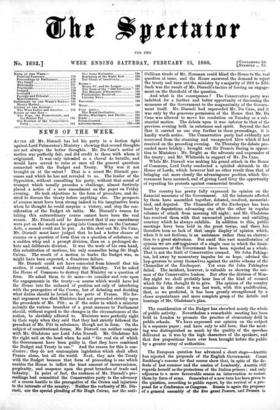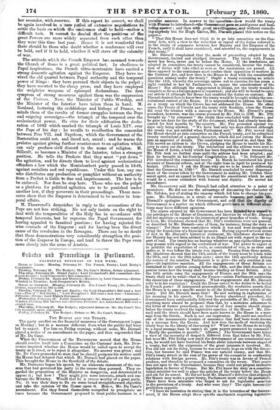The European question has advanced a short stage—Austria has rejected
the proposals of the English Government. Count Rechberg's reasons for that course show that, in spite of the de- feats of last summer and the cession of Lombardy, Austria still regards herself as the protectress of the Italian princes ; and only adjourns to a more favourable season an intervention to restore them by force of arms. Somewhat of a new turn has been given to the question, according to public report, by the revival of a pro- posal for a Conference or Congress. Russia is again the proposer of a general assembly of the five great Powers, and Prussia is
her seconder, with reserves. If this report be correct, we shall, settle the basis on which the conference shall be held—rather a be again involved in a new period of extensive negotiations to difficult task. It cannot he .denied that the .positions iof great Powers are more widely separated from each other than they were this time last year. Hence it is not wonderful that there should be those who doubt whether a conference will ever be held, and if it be held, whether it will stave off the calamity of war.
The attitude which the Frendh Emperor has assumed towards the Church of Rome is a great political fact. In obedience to Papal inspirations, the French ultra-montanists have excited a -strong domestic agitation against the Emperor. They have re- lived the old quarrel between Papal authority and the temporal power of Kings : they have pursued their objects in the pulpit ; They have resorted to the cheap press and they have employed the weightier weapons of episcopal declarations. The find symptom of strong measures against them was the suppression of the Univers. Now, the Minister of Public Worship, and the Minister of the Interior have taken them in hand. M. Rouland, lecturing the archbishops and bishops of France, re- minds them of the results of former struggles between the Pope and reigning sovereigns—the triumph of the temporal over the ecclesiastical power. He cites for their edification the decla- ration of 1682 which marked the triumph of -Louis XIV. over the Pope of his day ; he recalls to recollection the concordat 'between Pius VII. and Napoleon, which the Government of the -Restoration could not, and dared not, annul; and he warns the 'prelates against giving further countenance to an agitation which can only produce civil discord in the name of religion. M. Billault, as becomes a Minister of the Interior, takes a stronger position. He -tells the Prefects that they must "put down" the agitation, and he directs -them -to level against ecclesiastical offenders a law which the Mcmtalembert party passed in 1849, -against socialists and red republicans. Under this law, any one who distributes any production or pamphlet without an authority from a Prefect is liable to fine and imprisonment. The law is to be enforced. Nor does he stop here. Those who use the pulpit as a platform for political agitation are to be punished under another law, if they persevere in their proceedings. These mea- sures show that the Emperor is determined to be master in tem- poral affairs.
M. Thouveners despatches in reply to the accusations of the Pope are not less striking. He not only insists on the right to deal with the temporalities of the Holy See in accordance with temporal interests, but he reproves the Papal Government for having appealed to fanatical passions ; for having rejected the wise counsels of the Emperor ; and for having been the direct cause of the revolution in the Romagna. There can be no doubt that these demonstrations very considerably strengthen the posi- tion of the Emperor in Europe, and tend to throw the Pope even more closely into the arms of Austria.



























